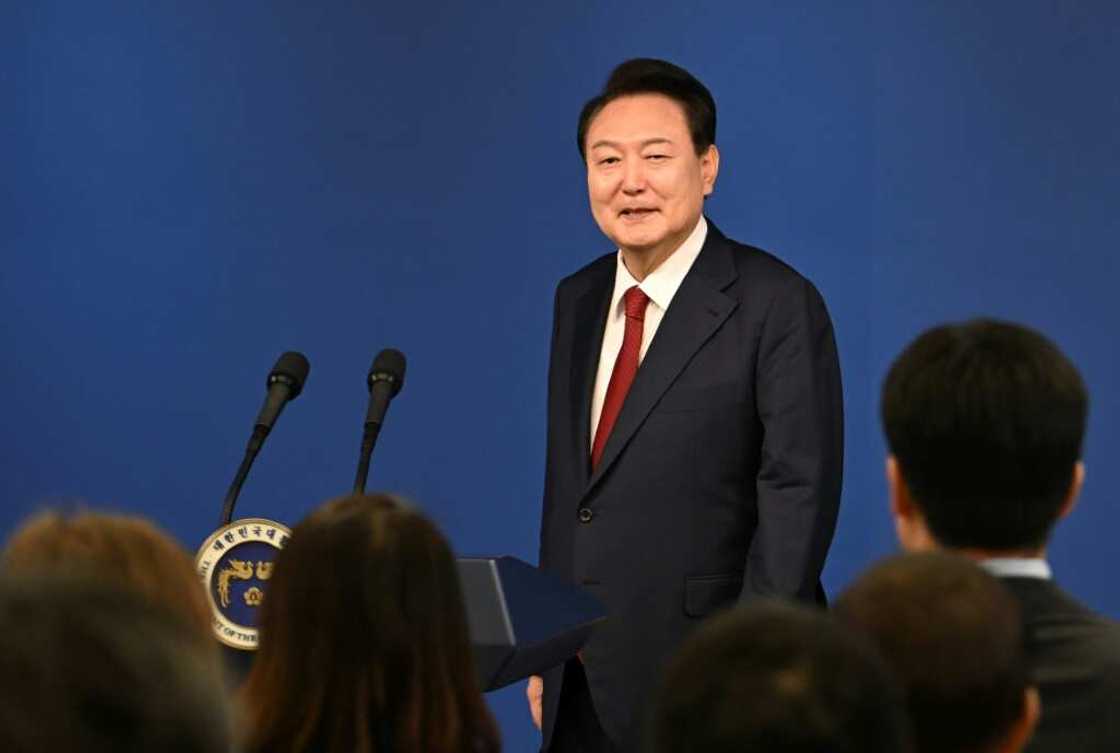S.Korea president announces record $19bn plan to boost chip industry

Source: AFP
South Korean President Yoon Suk Yeol on Thursday announced a record $19-billion-dollar support plan for the country's crucial semiconductor industry.
South Korea is home to the world's top memory chipmakers Samsung Electronics and SK hynix and last year pledged to build the world's largest chip centre using $456 billion of private investment as it seeks an edge in the global industry.
"We have created a comprehensive support programme for the semiconductor industry worth 26 trillion Korean won, which encompasses financial, infrastructure, research and development, as well as support for small and medium-sized companies," he said, according to a statement from his office.
The package includes a $7 billion investment announced earlier this month.
Yoon also said Seoul would extend tax benefits for chip investments, in hopes of boosting employment and attracting more talent to the industry.
The country is also building a "mega chip cluster" just outside Seoul, which the government claims will be the world's largest semiconductor-making complex and create millions of jobs.
PAY ATTENTION: Share your outstanding story with our editors! Please reach us through info@corp.legit.ng!
"As you all know, semiconductors are a field of national all-out war," Yoon said.
"Winning or losing depends on who makes the state-of-the-art semiconductors with high information processing capabilities first. The state must provide support for semiconductors so that they do not lag behind competitors," he added.
With the new package, Yoon said there would be a "new semiconductor financial support programme worth 17 trillion won" run through the Korea Development Bank, to allow companies to make crucial new investments.
"As companies invest enormous amounts of money in facilities such as new factories and line expansions, liquidity problems arise," he said.
"I believe that these difficulties will be largely resolved through the Korea Development Bank's support programme," he added.
Key sector
The plan will also create a "semiconductor ecosystem fund" worth a trillion won, which will support fabless companies and small and medium enterprises linked to the industry.
"Our fabless market share is still in the one percent range, and foundry, which manufactures system semiconductors, is unable to close the gap with leading companies such as TSMC," Yoon said.
Earlier this month, Seoul said it would set up an aid package worth more than $7 billion to support its chip industry, as part of its drive to boost the semiconductor sector, which is critical to the world's fourth-largest economy.
The moves come as the government looks to invest heavily in six key technologies including chips, displays and batteries, all areas where the country's tech giants are well-established already.
Semiconductors are South Korea's leading export and hit $11.7 billion in March, their highest level in almost two years, accounting for a fifth of South Korea's total exports, according to trade ministry figures.
Samsung in May 2022 unveiled a massive 450 trillion won five-year investment blueprint aimed at making the country a frontrunner in key sectors from semiconductors to biologics.
Securing supplies of advanced chips has become a crucial issue internationally, with the United States and China locked in a fierce battle for control of the market.
"South Korea is supplying 80 percent of the world's memory semiconductors, and has said it is investing 300 trillion won in the Yongin cluster, but there has been a water supply issue with it," Kim Dae-jong, a professor of business administration at Sejong University in Seoul, told AFP.
"On top of tackling such issues, today's announcement seems to be an effort to support innovative small and medium-sized enterprises to further strengthen their competitiveness against (rivals) like Taiwan."
PAY ATTENTION: Stay Informed and follow us on Google News!
Source: AFP


